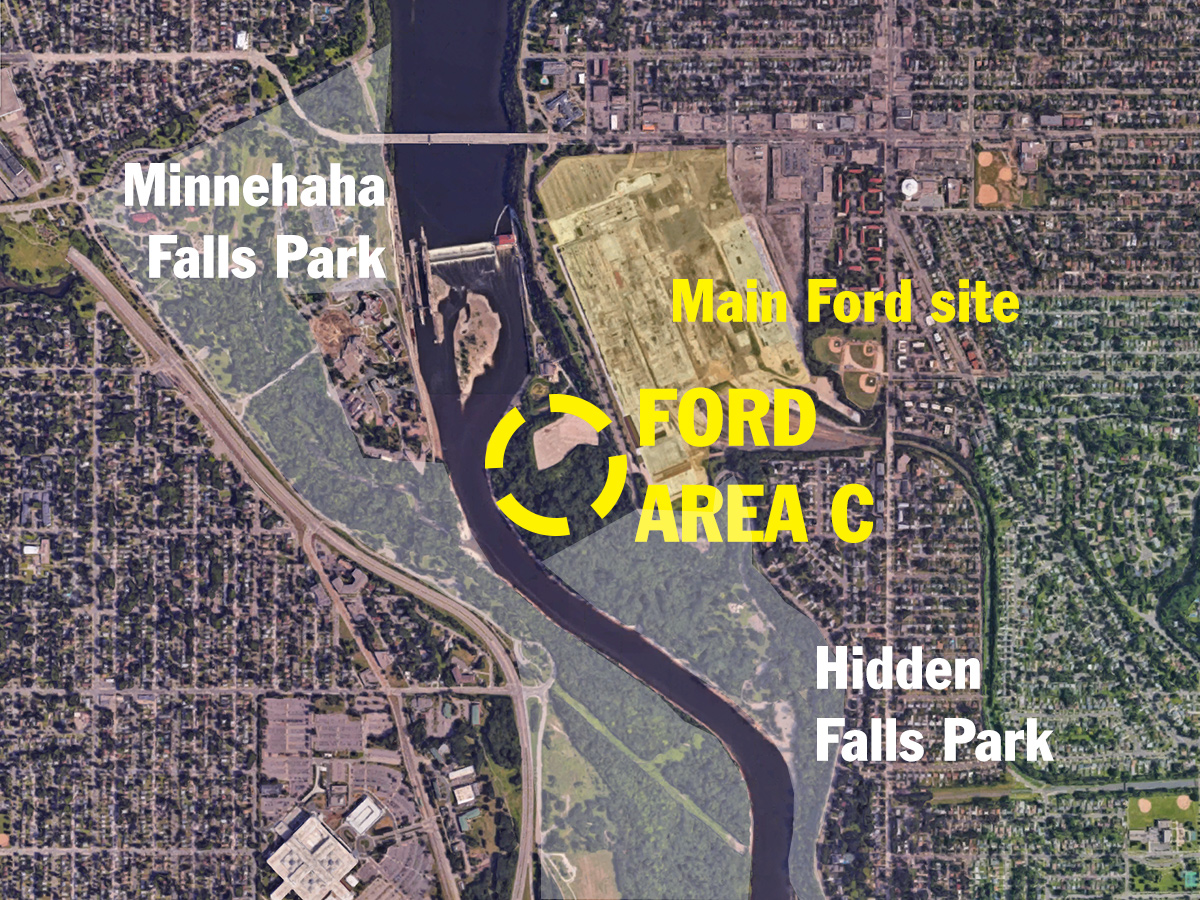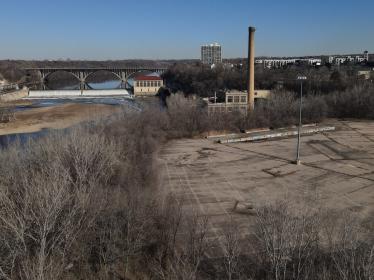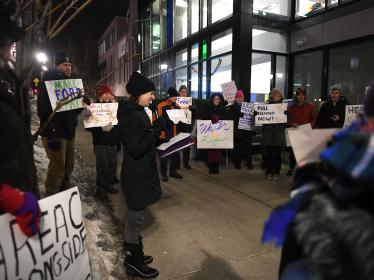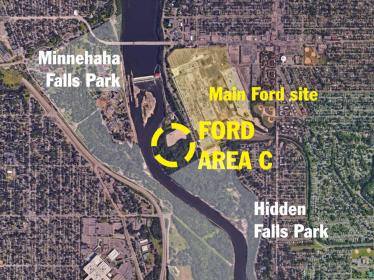Ford Area C: The overlooked toxic waste dump along the river

You might be familiar with the main Ford site and its redevelopment plans, but the hazardous waste dump site at Area C on the river's edge is less well-known. Three beloved parks, Hidden Falls Park in St. Paul and Minnehaha Falls Park and the Minnehaha Dog Park in Minneapolis, lie immediately downstream of this site.
Note: The Minnesota Pollution Control Agency is taking community feedback about a cleanup plan for the Ford Area C hazardous waste dump. Join us for a rally before the MPCA community meeting Jan. 15, 2026.
The redevelopment of the Ford Motor Company Twin Cities Assembly Plant site along the St. Paul river bluff has attracted a lot of attention. FMR has been an active advocate for density, parks and environmentally sensitive development throughout this years-long process to develop the Highland Bridge neighborhood.
However, we've also been focused for many years on another part of the Ford site that's gotten much less attention: Area C.
What is Ford Area C?
From 1945 until 1966, the Ford Motor Company dumped unknown quantities of industrial waste, including solvents and paint sludge, on the floodplain of the Mississippi River below the bluff near its St. Paul assembly plant. Construction rubble from Ford, the U.S. Army Corps of Engineers and the city of St. Paul was later added on top of the hazardous waste, creating a massive pile of concrete, steel and other debris. This dump was un-permitted and unlined.
The dump, known as Area C, adjoins the popular Hidden Falls Park and the Mississippi River. When the river rises, floodwaters regularly inundate the site. We don't know how much hazardous waste remains in the pile or when it is most likely to wash into the river.
What's in Ford Area C could affect many people (not to mention wildlife): site neighbors, visitors to the nearby popular regional parks, river lovers, anglers and everyone who uses the river or its water downstream. The public needs ample opportunity to be informed about any threat and involved in its remediation.
While Ford Area C is somewhat inaccessible to the public, you can see it from a few different vantage points: Hidden Falls Park, the Ford bridge, across the river near Lock and Dam No. 1 and in some parts of Minnehaha Park. It’s possible you’ve even visited the site without knowing it, as the concrete pad covering the dump once served as a State Fair park-and-ride lot.
What's leaking into the river? And what should we do about it?
Ford and the Minnesota Pollution Control Agency (MPCA) have long asserted that any toxic waste leaking into the river from this dumpsite is within the levels considered safe for humans. However, we weren’t sure whether the groundwater monitoring systems Ford installed years ago were sufficiently capturing and characterizing the risk. In partnership with the Capitol Region Watershed District, we had engineers review Ford's monitoring plans and data in 2017-18.
Those consultants identified gaps in the groundwater monitoring network surrounding the site. In particular, the monitoring wells weren’t in the best locations to capture any hazardous waste that washes out of the pile during floods. Flood conditions, which we’re seeing more frequently as a result of climate change, often raise water levels above the elevation of the hazardous waste. FMR and our partners met with the MPCA to share our consultants' findings and request that Ford expand its groundwater monitoring at Area C. As a result of this advocacy, Ford agreed to some expanded monitoring and installed additional wells in 2020. Ford also agreed to test for PFAS at our request.
Since the additional wells were installed, we have been waiting for the opportunity to monitor the pile during a flood. In 2023, the Mississippi River crested twice in St. Paul at high enough levels to inundate the waste pile. Groundwater samples taken during this time will help us understand more about the waste and move forward with cleanup. Monitoring continues, including during the 2024 flood.
Based on the monitoring data, Ford has begun a feasibility study to explore options for addressing Area C. The options they will assess include full dump removal and a range of partial removal scenarios.
When the feasibility study is drafted in late 2025, the MPCA will solicit public comments on the cleanup plan (online and at a community meeting). This will be a critical time for the community to weigh in. See the latest updates about Ford Area C below.
Get involved
This is a critical time to express your perspective.
The MPCA will weigh community input in its final selection of a cleanup plan after this last public comment period. There are three ways to speak up for a clean river for future generations:
- Join FMR at the Jan. 15, 2026 MPCA-hosted community meeting on Ford Area C cleanup options. Rally with FMR beforehand to show support for holding Ford accountable and fully cleaning up this hazardous site in St. Paul. Find all the event details here.
- Submit a written comment to the MPCA through their website by February 3, 2026.
- Sign our petition, which will also sign you up for email updates in the months to come. (Or sign up to be a River Guardian to receive local river advocacy notices and event invitations without signing the petition.)
For more information about Area C in general, please contact FMR Grassroots Organizer Jenna Hawkes


